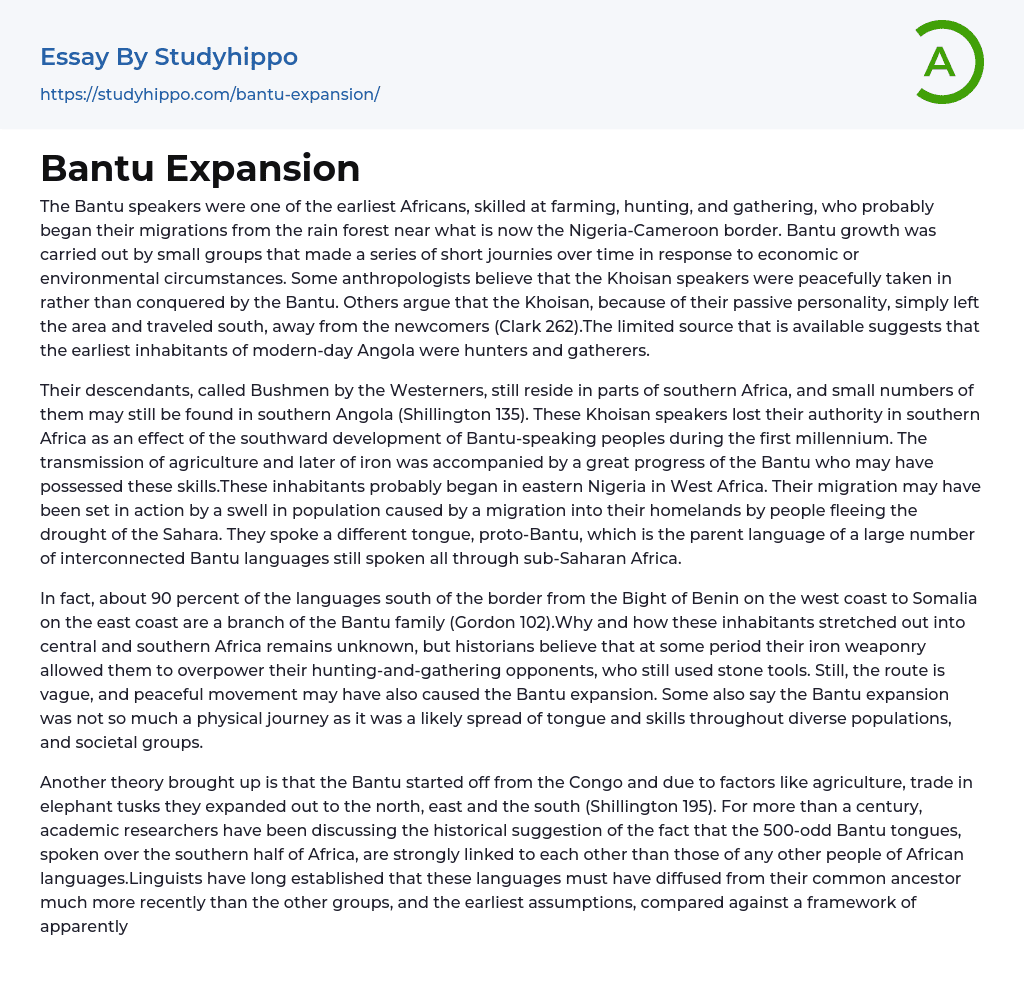The Bantu speakers were among the first African settlers, known for their expertise in farming, hunting, and gathering. They likely originated from the rainforest located near the border of present-day Nigeria and Cameroon. Bantu expansion occurred through a series of short journeys made by small groups in response to changes in economic or environmental conditions. Anthropologists offer different opinions on whether the Khoisan speakers willingly integrated or were conquered by the Bantu. Some believe that due to their placid nature, the Khoisan simply migrated southward in avoidance of the newcomers. Research suggests that the original inhabitants of modern-day Angola were hunter-gatherers.
The Bushmen, known by the Westerners as their descendants, still reside in various parts of Southern Africa. Although small groups of them can still be found in Southern Angola, they lost their power due to the southward expan
...sion of Bantu-speaking people during the first millennium (Shillington 135). The Bantu's migration began from eastern Nigeria in West Africa, possibly triggered by a population surge following a migration of people fleeing the Sahara's drought. They spoke proto-Bantu, a distinct language considered as the progenitor tongue of many interconnected Bantu languages spoken across sub-Saharan Africa. The Bantu's impressive progress was accompanied by the transmission of agriculture and ironworking skills.
Approximately 90% of the languages spoken in the region south where the Bight of Benin meets the west coast to Somalia on the east coast are part of the Bantu family (Gordon 102). The reason and manner in which these individuals moved into central and southern Africa remain uncertain, though historians suggest that their iron weapons allowed them to overpower stone tool-using hunting and gathering opponents. Nevertheless,
the exact path of expansion is unclear, and non-violent migration may have also led to the Bantu expansion. Some argue that the Bantu expansion primarily involved a spread of language and skills among diverse populations and societal groups, rather than a physical journey.
According to Shillington (195), one theory suggests that the Bantu originated from the Congo and, driven by factors like agriculture and trade in elephant tusks, expanded north, east, and south. Over the duration of a century, academic researchers have discussed the historical suggestion that the 500 Bantu languages spoken in the southern half of Africa share strong connections between them than with any other African language group. Linguists have confirmed that these languages must have diffused much more recently from their common ancestor than other groups, and early assumptions favored a military explanation of western imperialism, suggesting that the Bantu used iron spears to dominate their ancestors (Desmond 322). By the mid-1900s, however, attention shifted to food production and population growth.
According to J. Desmond Clark's "The Prehistory of Africa," the Bantu possibly absorbed their hunter-gatherer ancestors by cultivating crops using iron tools, leading to their expansion and dispersion across Africa over a period of about 1000 years. During this time, they adopted and integrated with existing societies while also spreading their own languages and cultures. By the 13th century, they had reached the southernmost area of the continent.
New York's Thames and Hudson published Gordan, A. and Gordon, D.'s Understanding Contemporary Africa in 1996.
The text within the states that Lynne Riener is the author of a book about London, while K. Shillington wrote a book titled "History of Africa" that
was published by St. Martin's Press in New York in 1995.
- South Africa essays
- Nigeria essays
- Ethnic Group essays
- Culture essays
- Social Control essays
- Citizenship essays
- Social Justice essays
- Caste System essays
- Social Responsibility essays
- Socialization essays
- Deviance essays
- Modern Society essays
- Popularity essays
- Civil Society essays
- Community essays
- Female essays
- Filipino People essays
- Igbo People essays
- Indigenous Australians essays
- Indigenous Peoples essays
- Minority Group essays
- Social Institution essays
- Men essays
- The nation essays
- Middle Class essays
- Social Norms essays
- Discourse Community essays
- Popular Culture essays
- Car Culture essays
- American Culture essays
- Mormon essays
- Indian Culture essays
- Mexican Culture essays
- Pop Culture essays
- Cultural Differences essays
- Culture Shock essays
- Different Cultures essays
- World War I essays
- World War Ii essays
- Atomic Bomb essays
- American Civil War essays
- Attack essays
- Cold War essays
- Crimean War essays
- Emilio Aguinaldo essays
- Iraq War essays
- Korean War essays
- Nazism essays
- Nuclear Weapon essays
- Philippine Revolution essays




